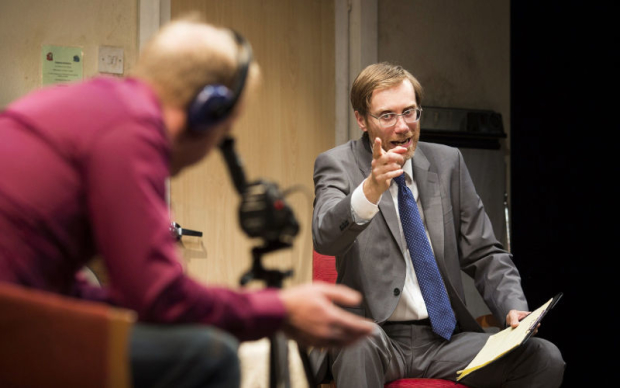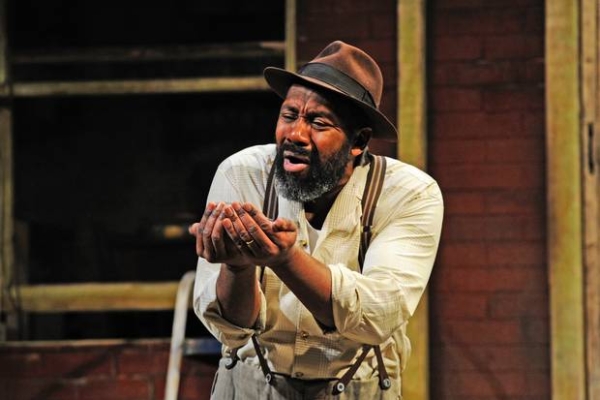Michael Coveney: Comedians playing it straight on stage
Stephen Merchant is the latest high profile comic to tread the boards

© Helen Maybanks
There's a sense in reading the reviews of Richard Bean's The Mentalists starring Stephen Merchant and Steffan Rhodri that, while Merchant's very good, he's not quite "acting". He himself corroborates this notion by making self-deprecatory, Nicholas "I, an actor" Craig (the invention of another comedian turned very good actor, Nigel Planer) – style remarks along the lines of winning awards and holding court in Joe Allen.
It's curious how the serious business of acting has become tangled with notions of repellent "luvvie-dom" as if acting is a closed shop, a magic circle that only fully signed-up, dedicated, almost nominated, artists can enter. To a certain extent, this is true. At the highest level, actors like Alec Guinness, Paul Scofield and Maggie Smith cannot discuss what exactly they do for fear of breaking that seal of a special, inexplicable relationship with an audience; they themselves don't quite get the mystery, or the instinct, of it.
This is because technique and talent, revealing the soul of an artist, are indivisibly entwined. In Merchant's case, his bland, closed-up style of performance is ideally suited to the character he plays, an innocent fanatic who shows nothing. The neutrality of his expression is the source of his tragic power. And Bean's play, written in comic riffs and Pinteresque backchat, with a strong flavour of a less high-flown Beckett (nothing hieratic about the Finsbury Park hotel inmates in The Mentalists, as there is by the blasted tree in Godot) allows Merchant full rein on a mini-keyboard.
He's very tall, and very funny, but he's not Max Wall taking comedy valour into Beckett or Osborne, or even Ken Dodd burrowing into the psychic hinterland of Malvolio in Twelfth Night (or re-animating Yorick's skull in the Kenneth Branagh movie of Hamlet). Comedians can make the transition to the "legit" theatre – though I would argue that stand-up, vaudevillian comedy is theatre, anyway, in the first place – none more spectacularly in recent years than Lenny Henry, first as Othello (at the suggestion of Barrie Rutter, no comedy/classical slouch himself at the RSC and Northern Broadsides), then as Troy Maxson – his greatest performance – in August Wilson's Fences, and currently as the alcoholic Open University tutor in Willy Russell's Educating Rita at Chichester.

© Nobby Clark
I can't see Merchant following a similar arc in his stage career, whereas Henry – former star of kids' TV and the comedy circuit – seems bound, like King Lear, upon a wheel of fire that might well make him the first black British equivalent of James Earl Jones, only funnier. It's up to Merchant, though I suspect his ambitions are probably too self-contained and media-diverse to contemplate such a course, say, through the David Warner roles in Shakespeare and other British surrealists.
Like so much of modern comedy and drama, The Mentalists owes loads to Beckett, and it's no accident that the late Rick Mayall and his comedy partner Ade Edmondson were absolutely terrific in Waiting for Godot many years ago. Then Eddie Izzard, the most brilliant modern stand-up in my experience, delivered scintillating performances as Lenny Bruce and in David Mamet's The Cryptogram (holding his own with Lindsay Duncan in the Ambassadors Theatre world premiere in 1994).
The clue to this conundrum might lie in the personality of the performer. Merchant's a sort of sideman, a sponge, soaking up the ludicrous extravagances of Ricky Gervais in The Office; they are, in fact, those two, like Andrew Aguecheek and Toby Belch in Twelfth Night, except that Merchant's Aguecheek has qualities of critical come-back. In The Mentalists, too, you feel there's something self-knowing under this portrait of pathos and gullibility.
Which is why, if he wants to, he could easily expand into other roles. All good actors have something self-critical about them, an intelligence and spirit that both invades and disputes with the role they are playing. Brecht called this the alienation effect.
Some great comics make good actors, and some don't. Jimmy Jewel, for instance, simply couldn't submerge himself in the arguments of the old music hall relic in Trevor Griffiths's classic Comedians; he baulked at the character's alignment of comedy with Nazism in the wrong sort of critical way. And can you really imagine the overbearingly smug Michael McIntyre giving us a Feste, or an Autolycus – the two greatest clown roles in Shakespeare – with all the rough edges, or the inner melancholia?
One of the best Autolycus's I ever "heard" was Benny Hill on the radio, often the best way of experiencing Shakespeare anyway. ("What's the best way to do Peer Gynt?" "On the radio," as they say in Educating Rita.) Personality in acting is the key, and it's because the stand-up comic has just that – and his timing – to fall back on that they often make very good actors. But not always. And that's just another element in the mystery of it all.












